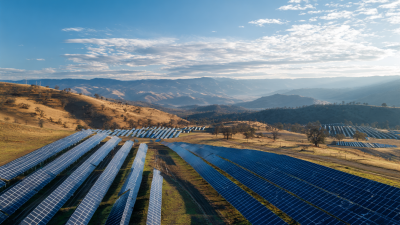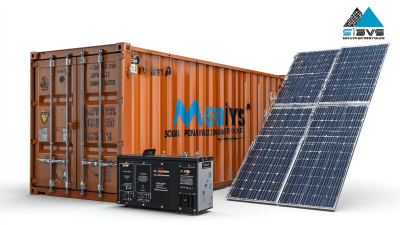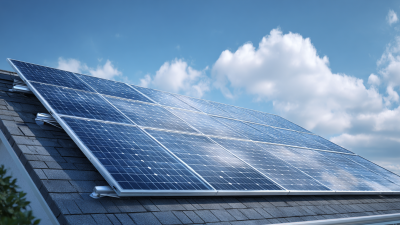Tel : 94870 36000, 94860 36000, 94890 36000
Comprehensive Guide to Choosing the Best Water Solar System for Global Buyers
As the demand for sustainable energy solutions continues to rise, the Water Solar System has emerged as a pivotal technology for both residential and commercial applications worldwide. According to the International Renewable Energy Agency (IRENA), solar energy accounted for over 10% of global electricity generation in 2022, and among this, solar water heating systems are projected to grow significantly, driven by increasing efficiency and decreasing costs. With innovations in photovoltaic and thermal technologies, consumers can access highly efficient and eco-friendly solutions tailored to their specific needs. However, selecting the right Water Solar System can be overwhelming due to the myriad of options available. This comprehensive guide aims to equip global buyers with the necessary insights and criteria to make informed decisions, ensuring optimal performance and maximum return on investment in their renewable energy journey.

Table of Contents
[Hide]
Benefits of Switching to Water Solar Systems for Sustainable Living
Switching to water solar systems offers numerous benefits that align with sustainable living practices. First and foremost, these systems harness the sun’s energy to heat water, drastically reducing dependence on fossil fuels and lowering greenhouse gas emissions. By utilizing a renewable energy source, individuals and businesses can significantly cut their energy bills while contributing to a cleaner environment. As we face the challenges of climate change, adopting water solar systems becomes a practical choice for those seeking to lessen their carbon footprint.
Moreover, water solar systems promote energy independence. With the ability to generate their own hot water, households are less vulnerable to fluctuating energy prices and supply issues. This self-sufficiency not only leads to long-term savings but also provides peace of mind in the face of global energy instability. Additionally, modern solar technology has become increasingly efficient and affordable, making the shift to solar water heating more accessible than ever. As more global buyers consider sustainable options, investing in water solar systems presents an excellent opportunity for both financial and environmental benefits.
Key Factors to Consider When Choosing a Water Solar System
When considering a water solar system, several key factors must be weighed to make an informed decision. First, the geographic location is critical; solar efficiency varies significantly based on sunlight availability. Regions with consistent sunlight can maximize the output of solar thermal or photovoltaic systems, enhancing water heating or purification processes. Moreover, understanding local climate conditions can influence the type of technology to adopt—solar evaporation methods, for example, are particularly effective in hot, arid environments where solar energy can be harnessed for water extraction.
Another aspect to consider is the specific application of the water solar system. Different systems serve various purposes, such as irrigation, potable water, or industrial use. Buyers should assess their needs, taking into account the scale of the operation, the volume of water required, and the available infrastructure. The efficiency of the system, along with its integration with local water management practices, also plays a significant role in the overall effectiveness, ensuring that the chosen solution aligns with both environmental sustainability goals and economic viability.
Types of Water Solar Systems: Which One Suits Your Needs?
When choosing a water solar system, it's essential to understand the different types available and how each suits specific needs. The three main categories are active, passive, and hybrid systems. Active systems, which use pumps and controls to circulate water, are ideal for those needing efficient heating with precise temperature control. Passive systems rely on natural circulation, making them suitable for areas with fewer resources or technical support, as they generally require less maintenance.

Tips: Consider your climate and water demand when selecting a system. Active systems are advantageous in colder climates where more reliable heating is necessary, while passive systems can be effective in warmer regions with less temperature fluctuation.
Hybrid systems combine elements of both active and passive technologies, offering flexibility and efficiency. They are particularly beneficial for consumers seeking long-term solutions with the option to adapt based on future needs. Keep in mind the initial investment and installation costs, as they can vary significantly between system types. Always perform a cost-benefit analysis in line with your energy goals and budget.
Cost-Effective Strategies for Implementing Water Solar Solutions
 Incorporating solar energy into water supply systems is increasingly recognized as a cost-effective strategy for addressing both environmental impact and operational efficiency. Recent advancements in water-splitting technologies have the potential to revolutionize hydrogen production, leveraging solar energy to create sustainable fuel sources. According to recent research, these innovations not only promise a cleaner energy landscape but also present significant economic benefits, reducing reliance on traditional energy sources.
Incorporating solar energy into water supply systems is increasingly recognized as a cost-effective strategy for addressing both environmental impact and operational efficiency. Recent advancements in water-splitting technologies have the potential to revolutionize hydrogen production, leveraging solar energy to create sustainable fuel sources. According to recent research, these innovations not only promise a cleaner energy landscape but also present significant economic benefits, reducing reliance on traditional energy sources.
Tip: When evaluating solar water systems, consider implementing an energy and cost efficiency Model Predictive Control (MPC) framework. This approach has shown to minimize energy costs and integrate renewable generation effectively, ensuring you harness the maximum potential from your solar investments.
Moreover, the intersection of solar technology with circular water solutions highlights its role in sustainable practices within industries such as data centers. Adopting strategies that optimize water usage not only contributes to environmental conservation but also enhances operational efficiency. With rising energy costs, businesses are encouraged to invest in hybrid renewable systems that combine solar with other clean technologies, creating a robust framework for sustainable energy management.
Tip: Integrate Industry 4.0 technologies to further enhance sustainability in water solar systems. The use of data analytics and IoT devices can provide real-time insights, ultimately improving system performance and reducing wastage.
Maintenance Tips for Maximizing Efficiency of Water Solar Systems
To maximize the efficiency of water solar systems, regular maintenance is essential. First, ensure that the solar collectors are kept clean and free from debris. Dust, leaves, and dirt can significantly reduce the system's ability to absorb sunlight, ultimately impacting heat production. A periodic inspection of the panels will help identify any buildup that may need to be removed, ensuring optimal performance throughout the year.
Additionally, checking the fluid levels in the solar storage tank is crucial. Maintaining the proper level of water or glycol solution helps in effective heat transfer and prevents overheating or freezing during temperature fluctuations. Implementing routine checks for leaks in the piping and connections can also prevent costly damages and ensure the system runs smoothly. Lastly, consider scheduling professional maintenance at least once a year to conduct thorough inspections and necessary repairs, keeping your water solar system in top condition for years to come.
Water Solar System Efficiency by Technology Type
Related Posts
-

Innovative Alternatives to Enhance Your Best Water Solar System Experience
-

Exploring the Future of Solar Energy Innovations in 2025 with the Best Solar Panels Solutions
-

Global Trust in Quality from China with Best Solar Water Solutions
-

10 Reasons Solar Electricity is the Future of Energy with 85 Percent Growth Expected by 2030
-

Unleashing the Power of Best Solar Power Generators A Look at Dominating Chinese Manufacturing Worldwide
-

A Comprehensive Comparison of the Best Solar Panels Solutions for Your Home

